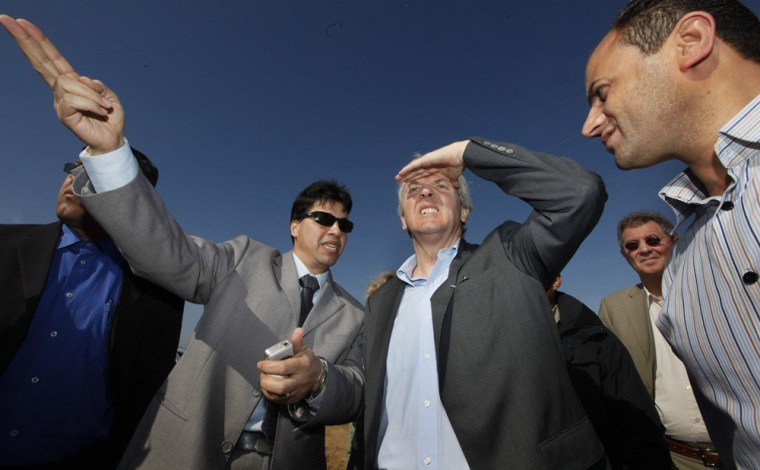The U.N.'s humanitarian chief Thursday launched a first-hand examination of the devastation wrought by Israel's offensive in the Gaza Strip so that the organization can begin providing desperately needed relief to the territory's 1.4 million people.
Also on Thursday, Israeli Prime Minister Ehud Olmert said the war could help hasten the return of a captive Israeli soldier long held by Palestinians in Gaza. Israeli media said some Cabinet ministers have softened their positions on releasing dangerous Palestinian prisoners in exchange for the soldier, signaling the government is trying to work out a deal with Hamas ahead of elections next month.
Opening a five-day trip to the region, U.N. humanitarian chief John Holmes called the steep Palestinian casualty toll from Israel's offensive "extremely shocking" and suggested the United Nations might ask Israel to compensate it for wartime damage to U.N. compounds in Gaza. Hundreds of tons of humanitarian aid were destroyed by Israeli shelling that struck the main U.N. compound.
"We want to make sure it is properly investigated and that we get proper accountability for it and proper compensation if it is needed and I think it will be needed," Holmes told reporters.
Low-level violence mars truce
Israel waged a 22-day war meant to end rocket fire on southern Israel from Hamas-ruled Gaza. Cease-fires declared by both sides Sunday ended an offensive that killed some 1,300 Palestinians and wounded thousands, according to Gaza health officials, and inflicted widespread destruction in Gaza. Thirteen Israelis were also killed, according to the government.
Low-level violence on both sides has marred the cease-fire and on Thursday a Palestinian man and girl walking near the shore in Gaza City were wounded by a shell fired from an Israeli gunboat, a Gaza health official said.
Another shell landed 100 yards away in an empty area near a U.N. aid distribution center. And heavy-caliber bullet fire struck at least one house in the area, a witness said.
The Israeli military said it was firing to deter a Palestinian fishing vessel that had strayed off-limits.
Gazans' immediate needs
On the first day of a five-day trip to the region, Holmes said he was looking at immediate humanitarian needs and thinking about longer-term reconstruction in Gaza. The biggest concerns, he said, are providing clean water, sanitation, electricity and shelter to people displaced by the fighting.
Gaza's blockaded border crossings will have to be opened to allow reconstruction to begin, he said.
"Goods have to be able to get in freely and in the right quantities, including construction materials, so that reconstruction can start."
Israel and Egypt have kept the crossings largely closed since Hamas militants seized power in Gaza in June 2007, choking off most supplies to the tiny seaside territory and trapping most of its 1.4 million people inside. Hamas says the borders must be opened as part of any cease-fire deal.
Israeli Cabinet Minister Binyamin Ben-Eliezer, who takes part in security deliberations, told Army Radio on Thursday that Israel wouldn't let border crossings with Gaza reopen without a deal to free Sgt. Gilad Schalit, captured by Hamas-affiliated militants in a June 2006 cross-border raid.
The international community is working with Israel to find ways to reopen the borders while guaranteeing that Hamas does not smuggle arms into Gaza that it can turn on Israel.
Anti-smuggling effort
Halting the flow of arms through Egypt into Gaza was one of the main objectives of the war. Senior Israeli envoy Amos Gilad headed to Egypt on Thursday to discuss ways to prevent Gaza militants from replenishing its war-battered arsenal.
Israeli Foreign Minister Tzipi Livni, meanwhile, was in Brussels recruiting European Union support for the anti-smuggling effort.
Israel wants the EU to contribute forces, ships and technology to anti-smuggling operations. EU officials who met with Livni on Wednesday said it was too early to make that commitment. The United States last week signed an anti-smuggling deal with Israel calling for expanded intelligence cooperation between the two countries and other U.S. allies in the Middle East and Europe.
Prisoner swap?
While Israel toiled on the diplomatic front to shore up gains achieved during the war, Israeli media reported that some Cabinet ministers have softened their position on releasing dangerous Palestinian prisoners in the hope of winning freedom for Schalit. Hamas has demanded the release of hundreds of prisoners, including convicted murderers, in exchange for Schalit.
A prisoner swap deal likely would be tied to an arrangement to end the Gaza blockade. Releasing Schalit before Feb. 10 elections could also boost the electoral fortunes of Olmert's governing Kadima Party.
The Yediot Ahronot newspaper said Olmert sees freeing Schalit as his top priority before leaving office in a few weeks. Army Radio said the prime minister hoped to clinch a deal by the end of his term.
"I believe the war created levers that could hasten Gilad Schalit's return home," Olmert told reporters while touring the rocket-scarred town of Sderot.
There was no immediate comment on the Israeli media reports from Hamas, which conducts its contacts with Israel through Egypt.
But the Popular Resistance Committees, one of the groups involved in Schalit's capture, called the reports of Israel's new flexibility "a new victory."
"Our demand is still the same, that all Palestinian prisoners which we have asked for be released and we emphasize the fact that releasing prisoners is at the top of our priorities," said Abu Mujahid, a spokesman for the group in Gaza.
Many Palestinian families have relatives in Israeli prisons and prisoner releases are of supreme importance in Palestinian society. Israel holds some 10,000 Palestinian prisoners in all.
Israel has balked at freeing the hundreds of Palestinian prisoners Hamas has demanded in exchange for the Israeli soldier because many were involved in deadly attacks on Israelis. The media reports might be an effort by the government to prepare the public for an unpopular prisoner release.
